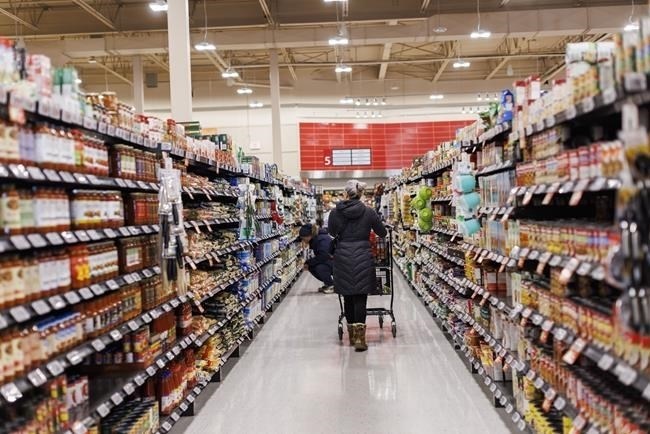
Statistics Canada is set to release its January consumer price index report this morning. A shopper browses in an aisle at a grocery store In Toronto on Friday, Feb. 2, 2024.
Image Credit: THE CANADIAN PRESS/Cole Burston
February 20, 2024 - 1:08 PM
OTTAWA - Canada's inflation rate fell more than expected last month as price growth moderated across the economy, including outright price declines for gasoline, airfares and clothing.
The annual inflation rate tumbled to 2.9 per cent in January, down from 3.4 per cent in December, Statistics Canada reported Tuesday.
The largest contributor to the decline was a four-per-cent drop in gasoline prices from a year ago.
Tuesday's numbers offer several layers of good news for consumers, as price growth decelerated in five out of eight components of the index, including the closely watched food category.
Grocery prices were up 3.4 per cent annually in January compared with 4.7 per cent in December.
There are also positive signs for the Bank of Canada as the latest figures show underlying price pressures easing and the headline rate falling back to the central bank’s one to three per cent target range.
On a seasonally adjusted monthly basis, prices in January fell for the first time since May 2020.
BMO chief economist Douglas Porter called the latest inflation report a "very pleasant surprise."
"I think really what doubled the level of surprise is the fact we saw almost the exact opposite story in the U.S. last week," Porter said in an interview.
The U.S. Labor Department reported last Tuesday that prices in January were up 3.1 per cent from a year ago, suggesting inflation was down from December but higher than forecasters had expected.
Prime Minister Justin Trudeau called the latest inflation figures "good news" and expressed hope that the Bank of Canada will start cutting interest rates soon.
"We are optimistic that the Bank of Canada will start bringing down interest rates sometime this year, hopefully sooner rather than later. But that is their decision to make," Trudeau said during a housing announcement with B.C. Premier David Eby in Vancouver on Tuesday.
Trudeau's government has felt the brunt of Canadians' anger about the cost of living over the last two years, to the benefit of the federal Conservatives.
With many Canadian households set to renew their mortgages at higher interest rates, the Liberals are hoping rate cuts this year will limit the financial pain and help their odds in the next election.
The Bank of Canada score measures of inflation — which strip out volatility in prices — fell in January but remain above three per cent.
The half-percentage-point decline in the headline inflation rate comes after a period of volatility in price growth, which added uncertainty to the timing of rate cuts.
Porter said the one caveat to Tuesday's report is that it followed two disappointing months for inflation.
"Let's get another month or two of below three per cent readings before really rejoicing," he said.
Canada's inflation rate briefly dipped below three per cent in June — falling to 2.8 per cent — but ticked back up in the second half of 2023 as underlying price pressures proved to be stubborn.
Since then, economic data has weakened, suggesting monetary policy is finally having a more meaningful impact on the economy.
Economists say deeper discounting in discretionary items last month suggest consumer demand is further weakening.
Airfares tumbled a whopping 23.7 per cent from December to January, while prices for clothing and footwear declined 3.2 per cent over that time period.
The Bank of Canada, which has held its key rate steady at five per cent, is widely expected to start cutting interest rates around the middle of the year as weaker economic conditions make way for lower inflation.
Governor Tiff Macklem has tried to dismiss rate cut talks as premature, but recently signalled that the central bank is inching closer to lowering rates.
Before it can pull that trigger, however, the Bank of Canada has been clear it needs more evidence that inflation is headed back to its two-per-cent target.
A new TD report suggests the biggest challenge facing the central bank is the housing market.
The report by James Orlando, director of economics, suggests no matter when the central bank starts to cut interest rates this year, shelter price inflation will still run at about six per cent in 2024.
The latest data shows costs were up 6.2 per cent in January year-over-year.
As the Bank of Canada considers when it should start lowering interest rates, Orlando suggests it needs to focus on the broader economy's health and set aside shelter price inflation.
"For as long as the BoC continues to focus on inflation metrics which are being held up by shelter inflation, Canadians will suffer under the weight of high interest rates," Orlando writes.
Eby, who has been critical of the Bank of Canada's rate hikes, once again blasted the central bank on Tuesday for fuelling shelter costs through higher interest rates.
"The Bank of Canada continues to hit us with high interest rates, driving inflation up by driving up the cost of housing," Eby said.
"I continue to try to drive home the message to the governor, that we will not get inflation under control in British Columbia without addressing the fact that higher interest rates are driving higher housing costs for people."
The central bank's next rate decision is scheduled for March 6.
This report by The Canadian Press was first published Feb. 20, 2024.
Note to readers: This is a corrected story. A previous version cited the wrong figures for the Bank of Canada's target range for inflation.
News from © The Canadian Press, 2024